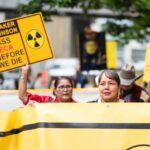Holding the Department of Energy accountable in Idaho
By Cecil D. Andrus | October 16, 2015
I have been involved in government at the state and federal level for a long time and have had my share of political and legal run-ins with government agencies, but rarely in more than 50 years in politics have I encountered a government agency more committed to secrecy—perhaps even deception—than the US Department of Energy.
Most citizens of my state know that, since last January, former Republican Governor Phil Batt and I have been raising questions about a plan by the US Department of Energy to bring additional shipments of commercial spent nuclear fuel to the Idaho National Laboratory in eastern Idaho for “research.”
Our opposition to these shipments involves a variety of concerns including, most important, that the proposed Energy Department action violates an historic agreement Governor Batt negotiated with the federal government in 1995 that specifically prohibits commercial spent nuclear fuel from coming to Idaho. We also object to the fact that the Energy Department still has no permanent disposal site for this material, which effectively means that once it is in Idaho it will stay here for a very long time. The fact that the Energy Department has also missed key milestones to treat existing highly radioactive liquid waste at the Idaho National Laboratory further complicates the picture.
What is the Energy Department planning? In January, when I first learned of the Energy Department's plans to bring additional spent fuel to Idaho, I started to gather information and ask questions. With the help of attorney Laird Lucas and his organization Advocates for the West, I requested, under the Freedom of Information Act (FOIA), copies of correspondence, internal memos, and other documents that I hoped would shed light on just what the federal government was planning to do in Idaho.
The Freedom of Information Act is one of our nation’s bedrock laws for good government. FOIA allows citizens to obtain information from federal agencies about their activities and plans. It is often described as “the law that keeps citizens in the know about their government.”
In 2009, President Obama and then-Attorney General Eric Holder “reaffirmed” the administration’s “commitment to accountability and transparency” by directing that federal agencies should timely and fully comply with FOIA requests from citizens. Regrettably, certain agencies, including the Department of Energy, prefer to keep American citizens in the dark about their activities and have not followed that mandate or the requirements of FOIA.
My search for documents related to the Energy Department’s activities in Idaho has been both eye-opening and disturbing. The fact that the federal government has refused to release information pertaining to its internal planning and how Idaho fits into waste disposal strategies certainly raises red flags for Idaho citizens. But there are also questions of national significance involved because the country still lacks an overall strategy for permanently disposing of vast amounts of highly radioactive waste. At my direction, Advocates for the West recently filed suit in federal district court in Idaho seeking to compel the Energy Department to comply with the law and share critical information with Idaho citizens.
A culture of secrecy. The Energy Department’s stonewall on public information is simply amazing. The department took months to respond to straightforward requests for information, and when it did finally respond, I received page after page of redacted documents. The only uncensored items the agency shared were clippings of newspaper stories that were already in the public domain.
My attorneys and I appealed that decision and, perhaps not surprisingly, the Energy Department rejected the appeal, saying that releasing information about its plans “would cause the harm of chilling open and frank discussion, limit government personnel’s range of options to consider, and detract from the quality of Agency decisions.” The Energy Department simply decided that the release of the information I requested and would have shared with Idahoans “would not be in the public interest.”
I may be old-fashioned, but it is hardly the job of a bureaucrat sitting in a cubicle in the Forrestal Building in Washington, DC, to decide what information about nuclear waste management in Idaho is “in the public interest.” A careful reading of the Energy Department's rationale shows that it intends to consider options for handling and storing highly radioactive material and make decisions of substantial public importance and potentially significant environmental impact in secret and without informing or consulting Idahoans and other interested parties.
The Energy Department’s culture of secrecy was, I believe, born during World War II, when nuclear weapons were first developed and secrecy was a paramount consideration. But the agency has never adapted, as the current situation in Idaho demonstrates, to a culture of transparency and engagement that engenders public trust and confidence. This is a problem I have observed since at least the 1970s in both Republican and Democratic administrations.
I’m left to conclude that the Energy Department has plans for Idaho that probably would not pass muster in the sunlight—including very likely plans to bring to Idaho, under the guise of “research,” significant amounts of commercial spent nuclear fuel that would then be “stored” indefinitely above the huge Snake River aquifer. I do know that the Energy Department has briefed a state commission on the possibility of future “research” at the Idaho National Laboratory involving more than 20 metric tons of spent fuel. Had this not been disclosed in a semi-public meeting by a government watchdog group, I would not know of the planning underway. What else do Energy Department planners have in mind? Obviously, they’re not saying.
In the public interest. FOIA litigation can be time-consuming, and it delays citizens from getting information they need to understand what the federal government is doing. I regret that my legal team and I have to bring such action, but having a federal court intervene and instruct recalcitrant agencies to abide by their FOIA obligations can be a powerful tool—shining a bright spotlight into dark agency corners.
The public interest is served when governmental decisions are made in the open. The Energy Department says it worries about a chilling effect on the ability of a government agency to discuss and consider options, but experience suggests that what government agencies really worry about is that disclosure of their plans will empower the public to take action to oppose those plans.
A lack of governmental transparency—think of critical decisions during the Vietnam War, the Watergate cover-up, the Iran-Contra scandal, or the run-up to the invasion of Iraq—often means vital decisions with great impact on citizens are made by a handful of people and in secret. That approach, as we should know from our history, is inconsistent with a democracy, and FOIA is a vital weapon to fight back against that kind of government.
Together, we make the world safer.
The Bulletin elevates expert voices above the noise. But as an independent nonprofit organization, our operations depend on the support of readers like you. Help us continue to deliver quality journalism that holds leaders accountable. Your support of our work at any level is important. In return, we promise our coverage will be understandable, influential, vigilant, solution-oriented, and fair-minded. Together we can make a difference.
Topics: Analysis, Nuclear Energy















